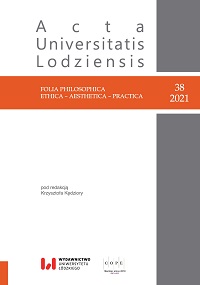The epistemic status of the principles of justice in Habermas and Rawls
DOI:
https://doi.org/10.18778/0208-6107.38.07Słowa kluczowe:
The Rawls-Habermas debate, principles of justice, validity claims, truth, justificationAbstrakt
The debate between Habermas and Rawls that took place in 1990s concerned how philosophy can justify the principles of justice under the conditions of pluralism of different and irreconcilable moral, philosophical, and religious doctrines. The context of the debate was mainly Rawls’ Political Liberalism and Habermas’ Between Facts and Norms as well. This paper argues that a wider geo-cultural perspective is pertinent in order to better comprehend the different justification strategies in Habermas and Rawls, concerning the principle of justice. This goes for their different geo-cultural experiences and presuppositions – in short, Rawls living in a self-confident North America in the post-war period versus Habermas’ German experience of civilization breakdown. However, it might also be relevant for the assessment of these two strategies in our time, faced with new kinds of geo-political differences and conflicts.
Bibliografia
Apel, K.-O. (1998). Auseinandersetzungen. Frankfurt am Main: Suhrkamp.
Google Scholar
Böhler, D., Kettner, M., and Skirbekk, G. (2003). Reflexion und Verantwortung, Frankfurt am Main: Suhrkamp, pp. 44–64.
Google Scholar
Finlayson, J. G. (2019). The Habermas-Rawls Debate. New York: Columbia University Press.
Google Scholar
DOI: https://doi.org/10.7312/finl16410
Finlayson, J. G. and Freyenhagen, F. (2011) (eds). Habermas and Rawls. Disputing the Political, eds. James Gordon Finlayson and Fabian Freyenhagen. New York: Routledge.
Google Scholar
DOI: https://doi.org/10.4324/9780203723869
Fukuyama, F. (1989). The End of History. The National Interest, 16, pp. 3–18.
Google Scholar
Fukuyama, F. (2014). Political Order and Political Decay. New York: Farrar, Straus, Giroux.
Google Scholar
Habermas, J. (1992). Faktizität und Geltung. Beiträge zur Diskurstheorie des Rechts und des demokratischen Rechtsstaats. Frankfurt am Main: Suhrkamp Verlag.
Google Scholar
Habermas, J. (1996). Between Facts and Norms. Cambridge, Massachusetts: MIT Press.
Google Scholar
DOI: https://doi.org/10.7551/mitpress/1564.001.0001
Habermas, J. (2019). Auch eine Geschichte der Philosophie. Berlin: Suhrkamp Verlag.
Google Scholar
Kędziora, K. (2019). Habermas and Rawls on an Epistemic Status of the Principle of Justice. Acta Universitatis Lodziensis. Folia Philosophica. Ethica-Aesthetica-Practica, 34, pp. 31–46.
Google Scholar
DOI: https://doi.org/10.18778/0208-6107.34.03
Langvatn, S. A. (2013). The Idea and Ideal of Public Reason. John Rawls’ Attempt to Conceptualize a Well-ordered Constitutional Democracy. University of Bergen: Bergen.
Google Scholar
Rohs, P. (2013). Der Platz zum Glauben. Münster: Mentis Verlag.
Google Scholar
DOI: https://doi.org/10.30965/9783897858688
Skirbekk, G. (1993). Rationality and Modernity. Oslo–Oxford: Scandinavian University Press–Oxford University Press.
Google Scholar
Skirbekk, G. (2017). Philosophie der Moderne: Vernunft, Wahrheit, Menschenwürde, Meinungsfreiheit. Weilerswist: Velbrück Wissenschaft.
Google Scholar
DOI: https://doi.org/10.5771/9783845292489
Skirbekk, G. (2019). Epistemic Challenges in a Modern World. Zürich: LIT Verlag.
Google Scholar
Tetens, H. (2015). Gott denken. Ein Versuch über rationale Theologie. Stuttgart: Reclam.
Google Scholar
Pobrania
Opublikowane
Jak cytować
Numer
Dział
Licencja

Utwór dostępny jest na licencji Creative Commons Uznanie autorstwa – Użycie niekomercyjne – Bez utworów zależnych 4.0 Międzynarodowe.












